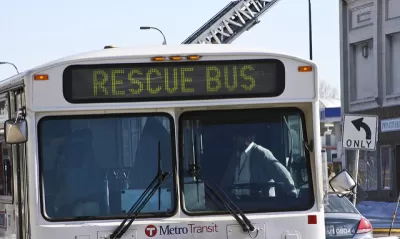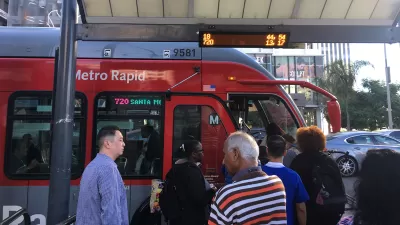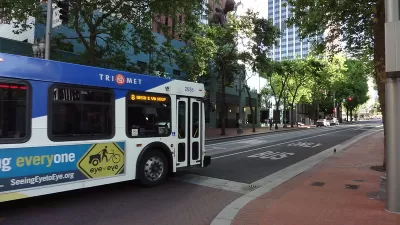While transit systems around the country had reason to celebrate the new funding made available in the federal infrastructure bill, long-term concerns about operational capacity have not been resolved.

"[The Detroit Department of Transportation] is making changes to routes across the city this week in an effort to improve service and reduce bus stop wait times," reports Eric D. Lawrence for Detroit Free Press.
C. Mikel Oglesby, Detroit's executive director of transit, is quoted in the article saying that the new schedules more accurately reflect the service currently provided, as the system "grapples with low ridership and a bus driver shortage." To minimize the inconvenience to riders, DDOT is targeting service reductions on low-ridership routes.
" [Oglesby] said DDOT is short about 90 drivers and ridership is down about 50%, from about 70,000 per day to 30,000-35,000 per day," reports Lawrence.
Bus driver shortages pre-date the pandemic—cities like St. Louis, Denver, and Minneapolis made news for cutting trips due to driver shortages in 2019, for example—but the problem has been perpetuated by the pandemic. MARTA also recently cut bus service in the Atlanta region, also citing bus driver shortages as the reason for the cutbacks.
In some respects, public transit seems to be prospering through the pandemic: Stimulus funding prevented the existential crises of Spring 2020, record amounts of new funding has been made available by the recently approved Infrastructure Investment and Jobs Act (IIJA), and a growing number of transit systems lowering or eliminating fares.
Despite those reasons for optimism, transit systems are still hanging by a thread (as reported on this site earlier in 2021): Ridership has been slow to return to most U.S. transit systems, the aforementioned driver shortages persist, and the IIJA also provided a record amount of funding for automobile infrastructure.
Most significantly to the future of public transit systems like the DDOT's, the structural deficit of transit funding for public transit operations in this country has not been resolved.
FULL STORY: DDOT to make route changes after low ridership, bus driver shortage

Planetizen Federal Action Tracker
A weekly monitor of how Trump’s orders and actions are impacting planners and planning in America.

Map: Where Senate Republicans Want to Sell Your Public Lands
For public land advocates, the Senate Republicans’ proposal to sell millions of acres of public land in the West is “the biggest fight of their careers.”

Restaurant Patios Were a Pandemic Win — Why Were They so Hard to Keep?
Social distancing requirements and changes in travel patterns prompted cities to pilot new uses for street and sidewalk space. Then it got complicated.

Platform Pilsner: Vancouver Transit Agency Releases... a Beer?
TransLink will receive a portion of every sale of the four-pack.

Toronto Weighs Cheaper Transit, Parking Hikes for Major Events
Special event rates would take effect during large festivals, sports games and concerts to ‘discourage driving, manage congestion and free up space for transit.”

Berlin to Consider Car-Free Zone Larger Than Manhattan
The area bound by the 22-mile Ringbahn would still allow 12 uses of a private automobile per year per person, and several other exemptions.
Urban Design for Planners 1: Software Tools
This six-course series explores essential urban design concepts using open source software and equips planners with the tools they need to participate fully in the urban design process.
Planning for Universal Design
Learn the tools for implementing Universal Design in planning regulations.
Heyer Gruel & Associates PA
JM Goldson LLC
Custer County Colorado
City of Camden Redevelopment Agency
City of Astoria
Transportation Research & Education Center (TREC) at Portland State University
Camden Redevelopment Agency
City of Claremont
Municipality of Princeton (NJ)




























